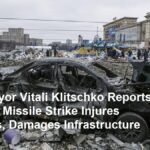On Tuesday, April 1, 2025, the Zimbabwe Republic Police (ZRP) arrested 95 demonstrators in Harare for allegedly inciting public disorder and anarchy during a protest against the leadership of President Emmerson Mnangagwa. This event, reported widely in the media, underscores the persistent political and socio-economic challenges facing Zimbabwe and highlights the government’s increasingly stringent response to dissent. The arrests warrant a closer examination of the underlying causes of the protest and the implications for the future of democratic expression in the country.
The demonstration itself, according to initial reports, was a direct response to the perceived shortcomings of President Mnangagwa’s administration. While the specific grievances of the protestors remain to be fully elucidated, it is likely they stem from a confluence of factors that have plagued Zimbabwe for years. These factors include persistent economic hardship characterized by high inflation, unemployment, and a shortage of essential goods and services. Despite promises of economic revitalization, President Mnangagwa’s policies have, to date, failed to deliver significant improvements to the lives of ordinary Zimbabweans.
Furthermore, the protests likely reflect growing discontent with the perceived lack of political reform and democratic freedoms. While President Mnangagwa initially promised a departure from the authoritarian rule of his predecessor, Robert Mugabe, critics argue that his administration has maintained a restrictive political environment. Concerns persist regarding limitations on freedom of speech, assembly, and association, as well as allegations of human rights abuses and the suppression of opposition voices. The recent arrests, therefore, can be viewed as a manifestation of pent-up frustration and a desperate attempt to voice grievances in a climate where alternative avenues for political participation are perceived to be limited.
The response of the ZRP to the demonstration raises serious concerns about the government’s commitment to upholding fundamental rights. The blanket arrest of 95 protestors, based on the broad and potentially subjective charges of inciting public disorder and anarchy, suggests a heavy-handed approach to managing dissent. Such actions can have a chilling effect on freedom of expression and potentially stifle future peaceful protests. It also raises questions about the proportionality of the police response. Were less forceful methods of crowd control considered and implemented? Did the ZRP adhere to international standards on the use of force and the protection of protestors’ rights? These questions require a thorough and transparent investigation.
The arrest of the Harare protestors also raises concerns about the independence of the judiciary in Zimbabwe. The fairness and impartiality of the judicial proceedings against the accused will be critical in determining whether justice is served. Concerns have been raised in the past regarding the influence of the executive branch on the judiciary, potentially undermining the principles of due process and the rule of law. International observers will be closely monitoring the proceedings to ensure that the accused are afforded a fair trial and that their rights are respected.
In conclusion, the arrest of 95 protestors in Harare is a stark reminder of the complex and volatile political landscape in Zimbabwe. The underlying causes of the protest, rooted in economic hardship and a perceived lack of democratic freedoms, demand urgent attention. The government’s response, characterized by mass arrests and potentially disproportionate force, raises serious concerns about the protection of fundamental rights and the future of democratic expression. The unfolding situation requires careful monitoring by both domestic and international actors to ensure that the principles of justice, due process, and freedom of expression are upheld. Ultimately, a sustainable solution requires a genuine commitment to addressing the root causes of public discontent and fostering an environment where peaceful dissent is respected and protected.












